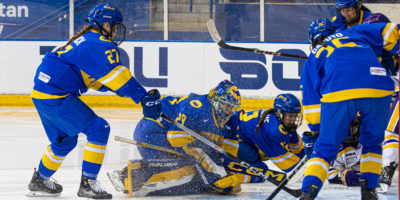By Jesse McLean
Features Editor
A popular professor caught misrepresenting his academic record 15 years ago is still featuring the controversial credentials on course outlines and Ryerson’s website.
Mahmood (Mike) Kassam, now associate chair of electrical engineering, once claimed he earned a PhD from a university in Hungary.
However, a 1992 Toronto Star article revealed that his and four other Ryerson engineering professors’ degrees from Miskolc University ranked below a PhD.
Ryerson has since corrected Kassam’s credentials on its academic calendar, citing “doctor universitatis,” which is equivalent to a master’s degree in North America. However, the school still refers to him as a doctor.
“If your credential is only a master’s degree in Canada, you have no right to call yourself a doctor. It’s that simple,” said Kevin Kamal, client service manager for the Toronto branch of World Education Services, an internationally respected organization that compares international degrees.
Kamal confirmed that Kassam’s degree is only equivalent to a master’s.
Kassam declined to comment on his academic record.
Ryerson’s credential verification policy maintains that faculty who have unrecognized degree names are not allowed to claim they have a PhD or equivalent status.
But by allowing Kassam to call himself a doctor, Ryerson isn’t living up to its standards, Kamal said.
“By saying that he is a doctor, even though he has a master’s, it is not being honest,” he said.
Michael Dewson, Ryerson’s VP Faculty Affairs, disagrees.
Dewson said that it is conventional to refer to doctor universitatis — Kassam’s degree — as a doctor because of varying education practices across the world.
“Just because it’s confusing, it doesn’t mean anyone did anything wrong,” Dewson said.
A PhD generally refers to a research-driven degree. By contrast, Dewson said, other doctorates are more professionally focused.
“It doesn’t discredit the degree,” Dewson said.
Kassam went on several Ryerson-paid trips to Hungary in 1989, where he gave lectures and submitted a thesis at Miskolc.
After a year and a half, he returned with a degree in electrical engineering known in Hungary as a “little doctor” because it is the easiest of three types of doctoral degrees offered there.
Miskolc had no electrical engineering program at the time.
Meanwhile, Ryerson was in the process of becoming a university — a procedure requiring the institution to have a large proportion of instructors with doctorates. Records from 2005 show the school has increased its number of teachers with PhDs to 80 per cent from 20 per cent in the early 1990s.
Hungary has since reformed its post-secondary education system, including its PhD accreditation laws, to reflect international standards.
Students from Kassam’s fourth-year instrumentation class were surprised that their instructor didn’t have his PhD.
Several defended Kassam, saying he is one of the best teachers in the engineering department.
“It doesn’t matter. To me, he’s considered a doctor,” said Amir Abura, an electrical engineering student. “If I wasn’t so confident in his ability to teach, I wouldn’t be in his class.”
Students referenced Ryerson’s roots as a polytechnic institution, suggesting that industry experience and hands-on knowledge outweigh a degree.
“You might be a good researcher, but that doesn’t mean you can teach,” said Bilal Elahi, another student. “Dr. Kassam explains the stuff so we understand, and that’s what matters, right?”
Stalin Boctor, dean of engineering, isn’t worried about Kassam’s degree. He says Ryerson has already made the necessary amendments to the instructor’s credentials.
“The calendar has the proper description of his credentials, and that’s all I care about,” he said. “As far as I’m concerned, the issue has been closed for over 10 years.”











Leave a Reply